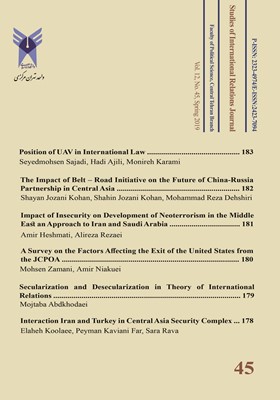The Impact of Belt – Road Initiative on the Future of China-Russia Partnership in Central Asia
Subject Areas : International RelationsShayan Jozani Kohan 1 * , Shahin Jozani Kohan 2 , Mohammad Reza Dehshiri 3
1 - MA in Regional Studies-East Asia of School of International Relations of Ministry of Foreign Affairs of the Islamic Republic of Iran, Tehran,Iran.
2 - MA in Regional Studies--West Asia(The Middle East) and North Africa(MENA) of School of International Relations of Ministry of Foreign Affairs of the Islamic Republic of Iran, Tehran, Iran
3 - Associate Professor in International Relations of School of International Relation of Ministry of Foreign Affairs of the Islamic Republic of Iran, Tehran, Iran
Keywords: Russia, China, Central Asia, Strategic Partnership, Key words: Belt- Road Initiative,
Abstract :
Abstract The one Belt one road Initiative constitutes a milestone for shaping the new and independent economic order vis-a-vis the United States in the Central Asian region, as one of the key areas for China and Russia to shape a strategic partnership between the two countries with a view to preventing the expansionism of the United States. The present study as a qualitative method with an analytical-descriptive approach and utilising library method for data collection, tries to explain the one belt-one road initiative, to study China-Russia relations in Central Asia, and to examine the impact of the one belt-one road initiative on China-Russia relations in the Central Asian region. In order to answer the question of what would be the impact of the one belt- one road initiative on China-Russia relations in Central Asia? The authors, by emphasizing on the neo-regionalist approach, believe that despite Russia's skepticism towards China's activities in Central Asia, the one belt-one road initiative would pave the way for the convergence of Russian-Chinese relations in Central Asia, taking into account the Western economic sanctions against Russia and the pressure of the United States towards China in the East Asian region.

